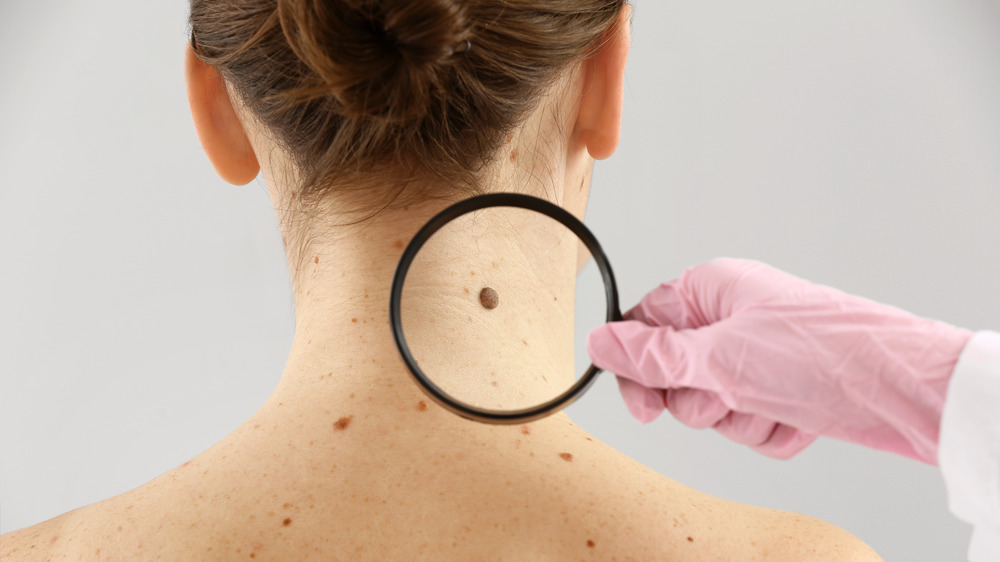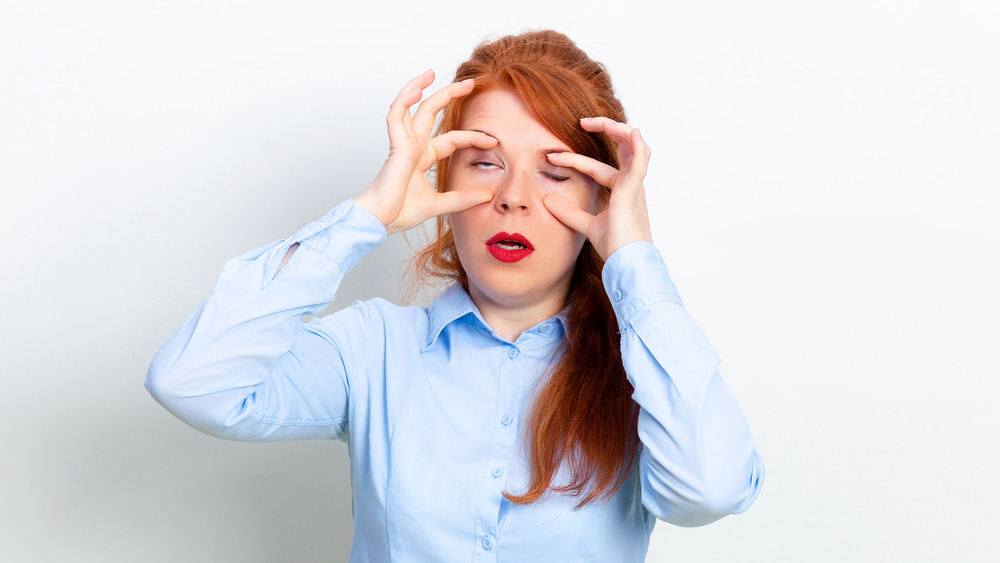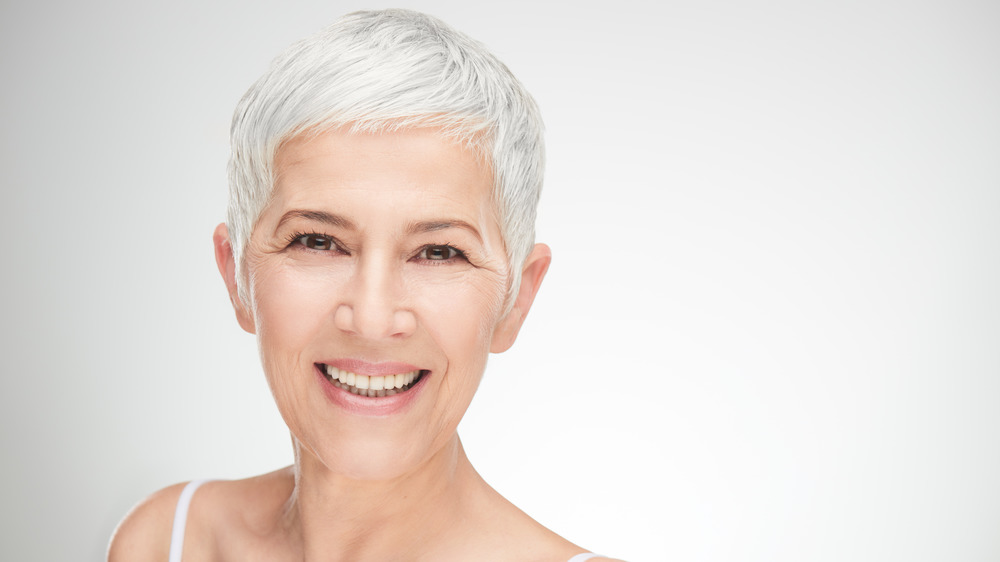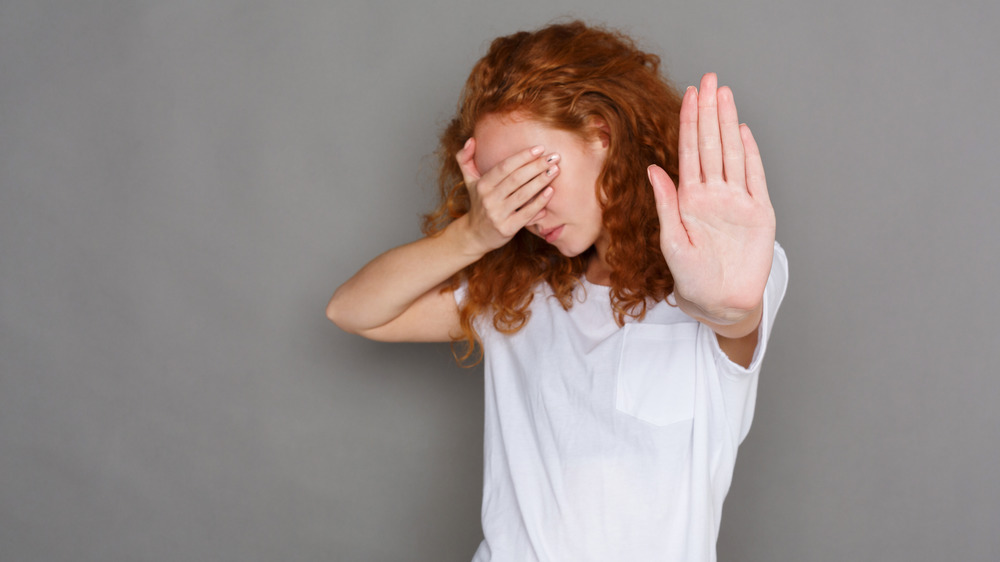Surprising Ways Being A Redhead Affects Your Health
Redheads make up just 2% of humanity, but their presence feels much bigger. For one thing, they're more prevalent in certain areas of the world than others: like Scotland, where redheadedness occurs in up to 13% of the population (via Health). Also, on television, redheads appear in 30% of prime-time ads, reports HuffPost.
Red hair is caused by variations of the gene M1CR, which determines hair and skin pigment. Genes come in pairs; people who inherit only one red hair gene won't have red hair but can pass the gene along to their own children, which is how non-redheads can have red-headed kids (via Stanford at The Tech).
Red hair is probably the most recent hair color to appear in human beings, according to a study of health problems in redheads published in Plos One. That study notes that some red hair genes may have been passed to us by our Neanderthal cousins before they went extinct. Fascination with redheads has led to a slew of myths about them, as well as interesting science, and it's not always easy to tell the difference.
Read on to sample some of the ways that having red hair can affect a person's health.
Redheads don't tan well and are prone to burning
Not all redheads have pale skin (via Vice). However, as revealed by LiveScience, the typical pale skin/red hair combo means a person has what's called Type 1 Skin according to the Fitzpatrick Scale, which rates sunburn risk. Skin in this category never tans and always burns, sometimes in a matter of minutes in strong sunlight.
Our skin and hair color is determined by melanin, a pigment that comes in two different varieties. The mix of those pigments produces hair and skin tone. If someone's genes code mostly for eumelanin, they have dark hair and skin. If they mostly produce pheomelanin, they'll have fair skin and red or blonde hair. (Other genes also influence hair and skin color).
Unfortunately, the pheomelanin version of melanin doesn't protect the skin from the sun's ultraviolet rays. This means people with red hair and pale skin lack the defensive mechanism of tanning; their skin goes right to a burn. And that means it's especially important for redheads to follow sun-protective strategies, like keeping covered in sunlight, using sunscreen, and avoiding the direct sun during peak hours (Skin Cancer Foundation).
Redheads have an increased of risk of melanoma
Melanoma is among the least common forms of skin cancer, but it's also the deadliest, causing 75% of all skin cancer deaths. It's a cancer of melanocytes, the pigment-producing skin cells that determine our skin and hair color (via Beaumont). People with red hair have a 10-100 times greater risk of melanoma, with their typically-fair skin leaving them more vulnerable to the skin-damaging ultraviolet rays of the sun, which can trigger the cancer process. And research also suggests that the gene which produces red hair comes with another vulnerability.
In redheads, according to a study started by National Library of Medicine-funded researchers, melanocytes seem to lack a protein that suppresses cancer growth. In some cases, if a cell also has a particular mutation that's caused by UV rays, this could make the cell more likely to turn cancerous, leading to melanoma. It's not clear why the redhead gene produces this phenomenon. But as scientists continue to examine the mystery, it's a reason for redheads to be extra diligent to use sunscreen and other skin-protection strategies.
Understanding red hair may lead to treatments for Parkinson's disease
Parkinson's disease is a neurodegenerative disease caused by the loss of neurons in a specific area of the brain. The condition produces tremors, paralysis, and other symptoms (via Parkinson's Foundation). People with Parkinson's disease are at increased risk for developing melanoma, a deadly skin cancer, and people who develop melanoma also have an increased risk for Parkinson's. The gene variant that produces red hair also increases melanoma risk, prompting researchers to wonder if it's involved in Parkinson's as well.
Preliminary research suggests this to be the case. According to a study by Annals of Neurology, mice who had a gene similar to the one that produces red hair in humans, also had brain cells that produced lower amounts of a neurochemical called dopamine — much like brain cells affected by Parkinson's disease. They also found that the brain cells were more easily damaged by toxins, but that making the red hair gene more active was protective against toxins. This could mean that one day, a similar treatment in humans could help treat the disease (via Parkinson.org).
Being a redhead may slightly affect endometriosis risk, but the connection isn't clear
Endometriosis is a condition affecting about 10% of all women during their reproductive years, causing pelvic pain that can be severe and debilitating, and sometimes causing infertility (Via Endometriosis.org).
To investigate a purported connection between endometriosis risk and having red hair, researchers conducted a study published in the National Library of Medicine, using health-related data supplied by over 90,000 women. Comparing self-reported hair color to the incidence of endometriosis turned up no relationship between the two; red hair had no effect on the likelihood of endometriosis. The only wrinkle? Risk was slightly higher for redheads who were fertile, while those who were infertile had a decreased risk. Melanoma, which is more common in redheads, is known to increase endometriosis risk, which could be part of the connection. In another study found in the International Journal of Epidemiology, people whose skin tended to burn easily in the sun — a common characteristic of redheads — were more likely to report having endometriosis. The researchers call for more investigation into these connections.
Redheads make more vitamin D
One reason that redheads are more common in certain parts of the world than others — like Scotland, where they represent 13% of the population (via Health) – could be the fact that pale-skinned redheads make more vitamin D in their skin than people with darker skin tones. In an interview with the Daily Mail, Alastair Moffat, director of a company that tests DNA for Scottish ancestry, speculated that this is why the cloudy clime of Scotland is home to so much red hair.
A lack of pigment leaves the skin of redheads especially vulnerable to sunburn. But in places where sunlight isn't strong, the theory goes, the ability to make more vitamin D becomes especially important, giving redheads an advantage.
Vitamin D is important for bone growth and immune function; most people get at least some of the vitamin D they need through sun exposure, and lighter skin makes more of it than darker skin. There aren't many food sources of vitamin D, aside from fatty fish like salmon and trout, but many milk, dairy, and plant milk alternatives like soy milk are fortified with extra D, according to the National Institutes of Health.
Redheads are sensitive to temperature changes
Despite their fiery reputation, anecdotally redheads often say they're the first to start shivering when the temperature drops. And temperature sensitivity is a common item on lists of facts about redheads. It turns out that there's scientific evidence that people with red hair really are more sensitive to cold temps.
According to a study published in Anesthesiology, researchers tested temperature perception in 30 women with red hair and 30 women with dark hair, using a device that applied hot or cold temperatures to a spot on their arm. The redheads were statistically more sensitive to cold temperatures than the other group, first feeling discomfort at 23 degrees C (73 F), compared to 55 degrees F for the dark-haired women. Redheads found the cold intolerable when it reached 43 F, compared to 32 F for the other group. Redheads also had slightly less tolerance for the hot stimulus, maxing out at 115 F, while the dark-haired women were able to handle temps up to 118 F. The study was conducted with women only, since women and men are known to have different pain sensitivities. So it's not known if these results would apply to male redheads as well.
Redheads seem to feel pain differently
Do redheads feel more pain than other people? It's complicated, which is why you're liable to find conflicting information on this question (via PBS). It seems like genes for red hair affect how redheads experience pain in different ways.
In one study published in Anesthesiology, researchers tested pain perception among sixty women, half of whom were redheads. When they applied heat or cold to a spot on their arm, the scientists found that redheads had less tolerance for pain caused by cold temps, compared to people with dark hair. But when they tested responses to mild electric shocks, there was no difference in reported pain. And in another study by the Journal of Genetics of 22 men and women, people with red hair had more tolerance to the pain of an electric shock.
As far as reconciling these contradictions, science isn't there yet, according to an interview with the researchers of both studies by PBS. But it is known that the area of the brain involved in pain perception contains receptors for the activity of the redhead gene, so it's possible that the gene has some effect on feeling pain. How it all works has yet to be unraveled.
Anesthesia don't work as well on redheads, but some painkillers work better
If you're an anesthesiologist, you may be familiar with the rumor that redheaded patients need a bigger dose to put them under. This was borne out in a study published in Anesthesiology that tested the effects of an inhaled anesthetic on 20 volunteers, all women, half of whom were redheads. (Only women participated, to avoid the complicating factor of gender on anesthetic requirements.)
After being sedated, each subject was given a small electric shock to test the anesthesia effectiveness. The dose was raised or lowered, and the test repeated, to determine the precise amount needed to block the sensation of the shock. People with red hair needed 19% more anesthesia than people with dark hair.
In a separate study, the same researchers found that women with red hair needed higher doses of a local anesthetic to block the pain of an electric shock, compared to people with darker hair. But, according to a different analysis published in the Journal of Genetics, researchers performed a similar test using a different, opioid-based painkiller and found that it worked better in redheads. So it seems redheadedness can have a different impact on pain relief, depending on how the medication in questions functions (via PBS).
Redheads have a lower risk of prostate cancer
After skin cancer, prostate cancer is the most common form of cancer in men, and the second leading cause of cancer death after lung cancer (via American Cancer Society). But for men with red hair, the risk seems to be reduced.
A study published in the British Journal of Cancer with health data relating to over 20,000 men found that those who had red hair were about half as likely to develop prostate cancer, compared to all other hair colors. As with other effects of having red hair, one explanation may be the fair skin that many redheads also have. There's some evidence that prostate cancer risk goes down with increased exposure to sunlight, perhaps because sunlight stimulates vitamin D production. (Sun exposure also raises the risk of skin cancer, which is why it's important to practice sun safety.)
By this way of thinking, their light skin enables red-haired men to benefit more from whatever protective factor sunlight provides against prostate cancer. However, other data from this study throws shade at that idea. When researchers compared the effect of skin phototype — that is, how sensitive it is to light — there was no connection between fair skin and prostate cancer risk.
Redheads have to live with certain stereotypes and misconceptions
The relative rarity of red hair means redheads tend to get noticed, which can be a mixed blessing. One research study published in Symbolic Interaction interviewed redheads about their experiences and found that they typically experienced "negative treatment" as children, leading them to feel low self-esteem and a sense of being different. They encountered stereotypes that redheads are hot-tempered, "clownish," weird, wild (if female), wimpy (if male). Some myths about redheads could have significant implications. For example, surgeons have been apprehensive about operating on redheads because of their supposed increased tendency to bleed; an examination of scientific literature on the topic found no evidence of such a danger.
On the plus side, the interviews mentioned above also found that most redheads turn early adverse life experiences into a positive outlook, coming to appreciate their hair color. Some stereotypes may work in their favor: that redheads are intellectually superior, for example. An analysis published in the Journal of Human Behavior in the Social Environment gathered data of "the hair color of CEOS of the top 500 members of the London Financial Times Stock Exchange" and found that redheads "were over selected to lead some of the United Kingdom's (and Europe's) largest, wealthiest companies."
Redheads tend to fear going to the dentist
A dentist appointment is nobody's idea of a good time. In fact, for as much 20% of the population, dental visits produce extreme anxiety. Among redheads, dentist-o-phobia may be twice as prevalent as it is for everyone else. One study published in The Journal of the American Dental Association documented this by surveying 144 volunteers, half of whom had red hair (as in many of these kinds of studies, red-headedness was confirmed by a DNA check). Participants were quizzed on their anxiety over dental visits and fear of dental pain.
Not only were people with red hair more likely to report anxiety about seeing the dentist, simply having the gene for red hair was an even stronger predictor of dental-related anxiety. People with the red hair gene were more than twice as likely to report avoiding dental care. This is notable because some people in the study had only one copy of the gene, which meant their hair was dark brown or black (it takes two copies of the gene to produce red hair). This means the gene affects pain perception or anxiety even in people who don't have red hair.
Redheads don't get gray hair...do they?
It's a bit of received wisdom that people with red hair don't go gray when they're older, but that their hair instead slowly fades and then turns white, skipping the graying phase altogether. Actual scientific documentation of this, though, is hard to find.
There is a kind of logic to the claim. Gray hair happens because our hair follicles produce less and less pigment as we get older. So each new hair that grows in may have less color; hair with no pigment at all is white (via The Washington Post). Gray hair is actually an illusion, in a way; each strand of "gray" hair is actually white, but appears gray because of the pigmented hair around it, according to Healthfully. Since red hair is the result of a lack of dark pigment, one might expect that the unpigmented hair that comes with age will tend to look more white than gray, due to the lighter pigment of the rest of the hair.
Redheads may be afraid of bees, but they don't have to be
One oft-repeated "fact" about redheads is that they get stung more often by bees, which seem to be attracted to their hair color. We suggest taking this one with a grain of salt, or maybe a spoonful of honey.
Washington State University entomologist Steve Shepherd, speaking to KREM, said that bees don't see the red end of the spectrum very well, and are more attuned to scent than color, making it unlikely that human hair color would attract them. KREM also reached out to MC1R – a magazine for redheads — who said they were unaware of any connection between redheads and bees. Whatever your hair color, your best bet for preventing a bee sting when spending time outdoors is to not wear fruity or floral fragrances; to dress in muted colors, keep food covered, and should a bee land on you, hold still until it leaves on its own (via Self).
Redhead ladies may have it worse
It may be that however red hair affects health, women tend to get a worse deal than men do. According to a study published in PLOS One, researchers in Eastern Europe surveyed over 7,000 people about their hair color, age, weight, and other parameters, as well as their health history. Their results showed that women with red hair did worse than other women in ten out of 24 health categories, including heart problems, cancer, musculoskeletal problems, and metabolic problems. For men, having red hair was associated with a worse outcome for three categories, and a better outcome for three others.
At least some of the impact of red hair on health may have more to do with having fair skin than with the red hair gene. A similar, more recent study in Scientific Reports of over 4,000 people also found that red hair was associated with more health problems. But this correlation mostly disappeared if skin tone was taken into account. Having fair skin, rather than red hair, seemed to be the important factor. This could mean that a lack of vitamin D, due to fair-skinned people avoiding the sun, is a factor in the higher rate of health problems among redheads.















